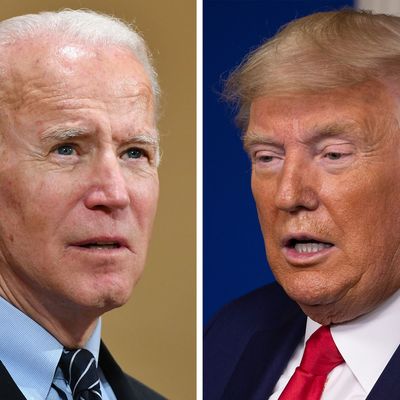
Way back in the fall of 2017, I argued that Democrats should not choose a presidential nominee older than the oldest man ever to win a first term in office, Donald Trump, mostly because candidates like Joe Biden and Bernie Sanders were of an age where mortality often casts a shadow:
Biden 2020 or Sanders 2020 is a really bad idea, for reasons that go beyond the anomaly that either would make the oldest man ever elected president the youth candidate in his reelection bid. There are certainly octogenarians who are physically fit, sharp as a tack, and as competent at work as any whippersnapper. But it’s no secret that when people, particularly men, get to that age, the risk of mortality rises significantly (a 75-year-old man has a 22 percent chance of dying within six years), and along with it the possibility of cognitive deterioration (an estimated 15 percent of people between the ages of 80 and 84 suffer from some form of dementia). If voters fear any of that happening, it could (particularly with some encouragement from the kind of intensely hostile conservative media that Sanders and Biden were spared in 2016) affect their electability in ways that are not easy to anticipate in scope and power. And even more obviously, if a 77- or 79-year-old candidate suffers from any real or perceived impairment, the issue could take over the campaign to an extent that makes Hillary Clinton’s email problem look minor.
Little did I know that the 2020 general election might be conducted in the wake of anything like COVID-19, with its particularly dangerous implications for people over 65. The positive test result for U.K. prime minister Boris Johnson was a reminder that heads of powerful governments are hardly immune — particularly if they are in the business of pressing the flesh and otherwise interacting with random citizens. So with all due deference to the superstitious fear of talking openly about this question, it’s time to follow Vox’s Ella Nilsen in an examination of what might happen if one of the two U.S. presidential nominees got sick and became debilitated, or worse.
“There’s not a lot of precedent to draw on; in fact, there’s none in which you’ve had an incapacitated nominee,” said Rutgers political science professor Ross Baker. “We elect mortals to the presidency. They suffer from all the ills that befall mortals.”
Presidents have died shortly after taking office (William Henry Harrison died six weeks after assuming the presidency in 1841, and Franklin Delano Roosevelt died a few months into his fourth term). But a death before a candidate accepts the nomination or gets inaugurated is uncharted territory in American politics.
In either horrid scenario, Republicans would have an advantage since they have an heir apparent in Vice-President Mike Pence. Under the terms of the 25th Amendment, in case of a presidential death or resignation before the next scheduled inauguration in January of 2021, he would become POTUS; in case of a declared or admitted presidential disability, Pence would become acting POTUS until such time as Trump regained his faculties. Given Pence’s renowned sycophancy, no one in MAGA-land would likely object.
For Democrats, it’s trickier. In case of a pre-convention illness, a presumptive nominee could still accept the nomination in writing (which used to be the norm) or by a phone call. If the medical situation is more dire, Democratic delegates are not legally bound by candidate pledges, so a convention could, in theory, choose a different nominee. That’s even more obviously the case if the presumptive nominee were to die before the convention.
In that (or in a post-convention scenario), partisans of Bernie Sanders might make the case for their champion as the runner-up in pledged delegates, but it’s more likely the party would turn to more of a unity candidate who is also a bit younger than Biden or Sanders. If a vacancy arises after the convention, Democrats would probably go back to the days before widespread primaries and choose a substitute nominee via some sort of party leader consensus, according to New York University professor Rick Pildes, a rare expert on this subject:
It’s nearly impossible to call back all the delegates for another convention, Pildes said. “You can’t reconstitute the convention, that’s just too unwieldy. At least to the Democratic Party, the rules specify the DNC in a circumstance like that would choose the replacement nominee for the party.”
So the number of people making the decision would be much smaller, reduced from thousands of delegates to about 447 DNC members, which are composed of state-elected members, current and former party officials (presidents, members of Congress, etc.), and representatives from party committees.
There are actually party bylaws dictating exactly that process.
It remains unlikely any of this will transpire. Arguably, the national pandemic will not only make it certain that actual or presumptive nominees look closely after their health, but will also all but eliminate the routine campaign rituals that might expose a presidential candidate to infection.
But it’s a time for anticipating the previously unexpected. No longer is it possible to scoff and say, “That’ll never happen!”






























